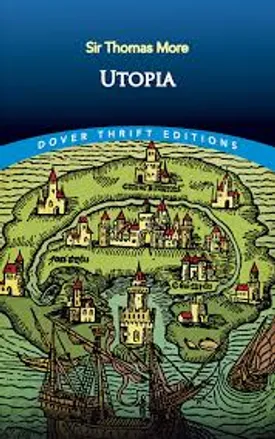Thomas More’s Utopia, published in 1516, is widely considered to be one of the first works of modern philosophical fiction. In the book, More creates a fictional island society inhabited by a people who adhere to a perfect, ordered way of life. Utopia has become a symbol for any society of perfect social order, and is now often used to discuss real-world issues of government and social structure.
The title of the book, Utopia, is derived from a term More coined in the text meaning “no place.” It is a play on words to signify the impossibility of true social perfection. Utopia is narrated by an otherwise anonymous traveler named Raphael Hythloday, who claims to have been to the island and witnessed its inhabitants.
Utopia is divided into two main books, each containing specific descriptions of this imaginary world. Book one introduces the reader to the island and the people who populate it. It accomplishes this by having Raphael tell the story of his visit and the customs, values, and laws of the Utopians. He portrays their society as one with no room for corruption or strife.
The Utopian society is based on Common Ownership, an idea that all land should belong to everyone. Unlike other societies, the Utopians believe that everyone should enjoy the same kind of education and that everyone should do some form of labor which is then shared. Everyone can pursue any profession they choose and laws are established to ensure that everyone is taken care of in respect to health, shelter, clothing and food.
The Utopians also create strict laws to ensure peace and justice for all. These laws are enforced through magistrates who represent the people making a particular decision. This creates an optimal system of government and social order in which citizens and magistrates alike hold each other accountable.
In Book Two, More goes on to discuss the various aspects of the Utopian’s social structure. This includes their religious system, which revolves around a belief of unity and the divine. More also speaks of their ideas of morality and justice. He writes of their ingenious judicial system, which seeks to end all disputes through arbitration, as well as various punishments for criminals guilty of severe crimes.
Utopia is a captivating work which encourages readers to think critically about our own world and the issues pertaining to it. Through his vivid descriptions, More challenges his readers to consider what an ideal society would look like, and whether such a thing is even attainable. His thought-provoking book has inspired countless debates and inquiries into what social perfection would look like. Utopia is a timeless classic which has endured for centuries, and it is sure to continue inspiring readers for generations to come.

